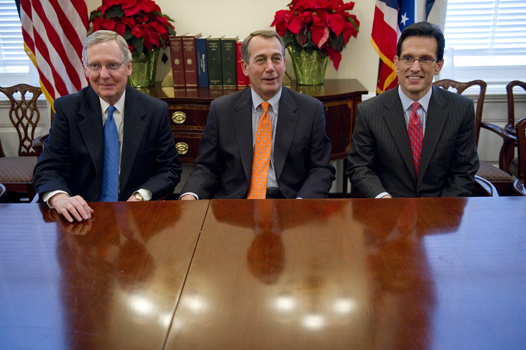This week, Congress is expected to continue funding the government at current levels through early March — at which point a newly Republican House of Representatives will get to take an axe to the federal budget. Naturally, they’re promising dramatic cuts in non-defense spending.
“I don’t know what’s going to happen here today, or tomorrow, or Sunday in terms of how we keep the government funded,” said soon-to-be House Speaker John Boehner at his weekly press conference last week. “But what I can tell you is all you have to do is go to the Pledge to America and we outline pretty… clearly that we believe that spending at ’08 levels is more than sufficient to run the government.”
Cuts at that level would have an impact on more than departmental budgets.
The 2008 benchmark appeals to the conservative base because it predates big spending items like the stimulus bill. But it would constitute a severe reduction in spending, to levels well below those proposed by President Obama and even Senate Minority Leader Mitch McConnell.
“if you look at non-security, then it’s about $88 billion, or about 20 percent below what’s in the omnibus [spending bill],” says Jim Horney, a fiscal policy expert at the Center on Budget and Policy Priorities. The omnibus spending bill, which would have funded the federal government through September 2011, died in the Senate last week — a victim of the anti-earmark hysteria that’s overcome the GOP. But Boehner says earmarks weren’t the only problem with the package.
“I think the spending levels were totally out of control,” he said.
That’s an implicit rebuke of McConnell, who basically set the overall price tag of the bill at $1.1 trillion.
If you carve out the non-defense items, according to Horney, you’d have to reduce the size of the federal government by one-fifth to return to 2008 spending levels.
“If you look at all the non-security programs, and say you can live without a fifth of this, that’s a huge change,” Horney says.
It’s not just a problem for federal agencies themselves, which would have to slash staff and learn to operate almost overnight in a much leaner environment. It would also counteract the stimulative effects of the tax package that just passed the House and Senate.
“To the extent that if you cut discretionary funding for 2011 and 2012 deeply, that’s going to offset the beneficial effect of the tax legislation that just passed,” Horney adds. “That would have a very, very negative effect on the economy.”
The macro impact of the GOP’s plan would be distinct from the hands-on ways they might — or might not — direct spending. If they don’t want to identify $88 billion in spending cuts, they can pass yet another continuing resolution to fund the government at slashed levels and let the executive branch sort out how to make that work. Boehner says he’d prefer to pass 12 separate appropriations bills, which would force them to single out programs and offices — but would also allow them to hack away at the health care law by denying the Department of Health and Human Services funds they’ll need to implement it.
That will be a challenge, though. “I’ve never seen them go through, and talk account by account, about what they would propose,” Horney says.






